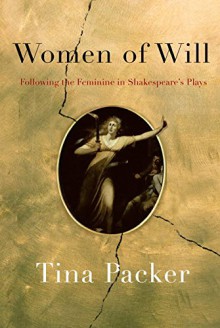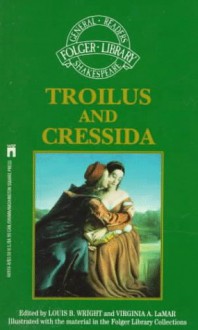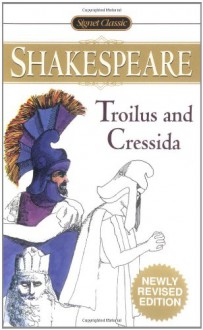
I think some reviews miss the point of Women of Will. This book is not an academic text written by someone who hasn’t “trod the boards” but by a producer, director and actor of Shakespeare’s plays who’s been engaging with the Bard for 40+ years, and who is presenting the insights she has gleaned from her experiences. And even more, it’s the author’s particular conclusions about Shakespeare’s relationship with women and how that came out in his plays. The reader can accept Packer’s interpretations as valid or not, depending upon their own reading (or acting) of the plays. What makes Packer’s interpretations so interesting is certainly not their academic rigor but that they’re made in the context of a firmly held belief that words can remake the world:
The actor Shakespeare could feel in his body the truth; the writer Shakespeare could record what he saw in the outside world and he gave to women the words to expose the dichotomy between what lay within and what was expected from without. And the only way to bridge the gap, alter, and bring it to a new relationship is through love. The women acknowledge the love and go on the journey. Creativity? It is the ability to see the world as it is, imagine what it might be, and step out with love (p. 299).
I’m not going to discuss the whole book. Packer looks at most of the plays over the course of 300 pages. To give you a taste, though, I will focus on two that I find personally interesting – “Troilus and Cressida” and “Measure for Measure” – and a section the author calls “The Plague Years,” where she imagines what Shakespeare was up to during the 1590s.
Packer’s readings of Shakespeare don’t exclude others. In preparing this review I pulled Mark van Doren’s Shakespeareand Marjorie Garber’s Shakespeare After All off my shelves to refresh my memory about what they had written. Van Doren’s “Troilus and Cressida” essay dismisses Cressida in less than a sentence, “That Cressida is not worth all this does not damage it as rhetoric…” (p. 174). As Packer argues in regards to Troilus, van Doren too appears unable to empathize with Cressida. Garber’s essay is more academic. She does treat of the women in the play but even she has little sympathy to spare for the young woman. Regarding “Measure for Measure,” van Doren is close to Packer, though he is writing from a broader perspective. She would agree with his conclusion: “It is the permanent symbol for a city, itself all earth and rotting straw, with which Shakespeare at the moment can do no more than he had been able to do with the diseased bones of Pandarus’s Troy. All he can do is stir it until its stench fills every street and creeps even into the black holes of prisons…. The bank of dark cloud above her [Vienna’s] forehead is never burned away” (pp. 191-2). In Garber’s “Measure for Measure” chapter, here too she and Packer are closer in readings than otherwise, touching on many similar themes, though – again – Garber’s perspective is broader. Which is understandable. Women of Will is not about anything but Shakespeare’s representation of women. Packer is interested in what she believes were Shakespeare’s encounters with real women that allowed him to grow as a writer and create increasingly sophisticated and nuanced characterizations not only of women but of men.
“The Plague Years”
This section is a speculative romp through Shakespeare’s life from 1587-1594, where Packer believes that something extraordinary happened to him: he fell in love. Through that love, his perception of women fundamentally changed. “He wrote as if he were a woman. Embodying them. Giving them full agency” (p. 52). The woman he fell in love with was the Dark Lady of the sonnets, whom Packer believes was Aemilia Lanyer (née Bassano), daughter of an expat Venetian musician and an English woman, also a musician. Shamefully perhaps, I had no idea that this remarkable woman existed, though now I’m interested in reading her work. It’s from his relationship with Aemilia, which may have lasted for these few years or perhaps for the 20 or so they could have known each other before his death, that Shakespeare “finally got it about women” (p. 90). His engagement with Lanyer inspired him to create female characters like Juliet, Beatrice, Rosaline and Lady Macbeth, and influenced his male roles as well, lifting them from the near greats like Richard III to the truly greats like Othello, Hamlet and Lear.
Of course, the Dark Lady wasn’t the sole influence that made Shakespeare Shakespeare during these years. Packer imagines quite a bit in reconstructing them. Aside from his new-found insights into women, perhaps the most important of these were the contacts he made with the circle of men and women who were the leading literary lights of the period and their noble sponsors – in particular Kit Marlowe and the Earls of Essex and Southampton. Shakespeare realized four things (according to Packer): One, poets were the greatest truth-tellers because their poetry gave them perceptions others couldn’t have [justifying Shakespeare’s life]. Two, music and poetry induced higher levels of knowledge and consciousness. [Shakespeare’s work began to incorporate music and his words became more rhythmic; he became conscious of the harmonies in a well-crafted sentence.] Three, poets are inspired, perhaps by something outside of themselves (the Muse) or something deep inside (the unconscious). Wherever it comes from, this “frenzy” cannot be denied. And, four, poetry – and even more so, theater – brought everyone, from the meanest pauper to the wealthiest noble, to the same perception and consciousness:
[J]okes about bodily functions and elementary sexual acts make people laugh, so they let go of themselves and un-self-consciously inhabit their bodies, and that this, combined with the most sublime poetry, allows the full spectrum of man’s being. Theatre can do something poetry by itself could never do – it can give us all of humanity, all kinds of people standing side by side, building a community of understanding, empathetic understanding. And that connection in turn fosters the perception and language of God. Potent and regenerative (p. 68).
“Troilus and Cressida”
I like “Troilus and Cressida” because, of Shakespeare’s three great plays about star-crossed lovers [“Romeo and Juliet” and “Antony and Cleopatra” are the other two], this one seems to me to be the most honest. Which shows what a pessimist I am.
Packer unpacks “Troilus and Cressida” in relation to “Romeo and Juliet” and “Antony and Cleopatra” and asks the question, “Why does this love fail?” Her answer is the unequal relationship between the lovers. Troilus is a prince of Troy, son of Priam. He has wealth, status, and the respect of family and comrades. Cressida is the daughter of a traitor and otherwise without family, status or wealth except for an oily uncle (Pandarus), whose situation mirrors her own. Her only asset is her virginity and she’ll be utterly vulnerable if she gives it up to Troilus.
But she does after both lovers pledge their undying love for each other in a scene worthy of the two more famous tragedies[1]. But where Romeo and Juliet and Antony and Cleopatra do die for each other, Troilus leaves Cressida at the mercy of Troy’s council, who have decided to trade her for the warrior Antenor. Abandoned and alone in the Greek camp, the teen-age girl’s spirit collapses and she throws herself on the mercy of Diomedes, a Greek warrior who seems sympathetic. Troilus, witnessing her from afar but unable to empathize with her plight, believes she’s unfaithful and abandons his love for the forgetfulness of violence. And so ends this love as one would expect it to in real life. The lovers don’t understand each other and fail to live up to the ideals they so readily espoused when their relationship was unthreatened; the relationship is destroyed; the lovers live on, though, and have to cope.
“Measure for Measure”
“Measure for Measure” doesn’t flinch from the fact that life is messy. Relying on a definitive recipe that answers all your questions, satisfies all your desires, and lets you get away with suppressing half of your identity leads to all kinds of trouble.
There are three protagonists: the Duke, Angelo and Isabella. Packer largely ignores the Duke as he’s peripheral to her intent. Angelo is a cold-hearted, supremely logical fellow who’s put in charge of Vienna to curb its carnal excesses. Isabella, arguably equally cold-hearted and logical, is a novice of the Order of St. Clare whose devotion to Christ is put to the test when Angelo threatens her virtue to save her brother. Both have walled themselves off form the messy business of emotions. When Angelo meets Isabella and argues with her over the fate of her brother, he recognizes a woman who can meet him on an equal footing and falls desperately in love with her. Unfortunately, he lacks the capacity to respond to her as an equal. He can only engage with her in debate or – in the end – by forcing her to accede to his desire. Isabella, for her part, is as constrained as Angelo. Unable, unwilling to admit to the possibility of love, she doesn’t recognize Angelo as a fellow soul. In the one moment when Angelo breaks down and opens the door to love, she refuses to walk through, instead threatening to expose him.
“Measure for Measure” examines the unconscious motivations present in all of us. Obviously, that’s not how Shakespeare would have put it but he recognized the relationship between repressed desire and physical violence. Once Angelo admitted to feeling a sexual attraction, he opened himself to myriad emotions that overwhelm his ever-so-rational mind: “Why does my blood thus muster to my heart, / Making both it unable for itself, / And dispossessing all my other parts / Of necessary fitness?” (2.4, 20-23)
“Measure for Measure” is listed as a comedy among Shakespeare’s plays. And everything does appear to work itself out in the end (as all comedies should) – Claudio lives and is reunited with Juliet, Angelo marries his fiancée Mariana, Lucio marries Kate Keepdown, and the Duke proposes marriage to Isabella. But I can’t imagine any of these pairings being successful except for Claudio and Juliet’s, which is the only one that’s based on any sort of mutual attraction and equality, the factors that Packer has stressed throughout the book that are critical to a successful relationship. It’s often brought up that Shakespeare leaves it up in the air how Isabella responds to the Duke’s proposal. By this point in the play, she’s speechless – literally. Various troupes have interpreted the character differently. Some have her responding with joy; others with horror. I lean toward the “horror” crowd. If they could get over their psychological hang-ups, it’s Angelo and Isabella who should marry.
There is one final thing I want to highlight. In one of her digressions, Packer discusses Shakespeare’s quest to discover what is the “soul,” which paralleled his discovery of the “female.” I thought it was an interesting insight. It sums us why she’s devoted so much of her life engaging with the Bard, and I quote her conclusion in full:
So I think in the end where Shakespeare comes out is: The soul is a verb, not a noun. It is substantive but not material. It lives in every breath we take. Therefore, the potential to be open to life is there within our bodies in every moment. The soul is the ability to sustain love – real love, which renews itself in the creative act. It is the maiden phoenix, the bird of the spirit, which burns up itself (which is painful) and, out of the ashes, creates itself anew (which is often hard but ultimately joyful). It can join with another, or many. It fills the body, is deeply erotic, and generates new life (p. 107).
As should be apparent from my rating, I enjoyed this book[2]. While some of her non-Shakespearean asides are cringe worthy[3], I found her Shakespeare-centered commentary stimulating and it made me see the plays in a new light. For example, her discussion of Goneril and Regan in “King Lear” revealed aspects of their characters that I hadn’t considered. They’re still not “nice people” but they’ve become more rounded individuals in my mind, and their motivations clearer.
Definitely recommended for Shakespeare fans, especially those interested in the insights of someone who’s directed and acted in the plays.
[1] Though Packer points out that Troilus’ language is more reminiscent of Romeo’s in regards to Rosalind, the woman he’s swooning for before meeting Juliet and whom he’s never actually met.
[2] Enough that I’ve ordered my own copy (albeit the paperback edition, which comes out next year (2016).
[3] As I write these words, I’m thinking in particular of her explanation of the Holy Roman Empire and the relationship between Emperor and Pope (p. 202).


 Log in with Facebook
Log in with Facebook 







